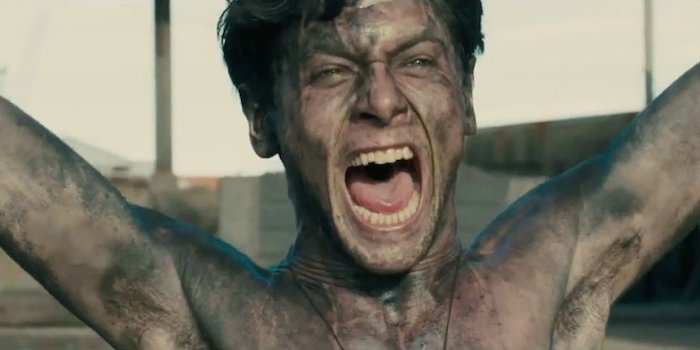“If I can take it, I can make it.”
The H-Bomb: Olympic distance runner Louis Zamperini (Jack O’Connell) joins the military during World War II, and is assigned to a bomber crew. While on a search mission over the Pacific, his plane crashes into the ocean, with only Louis, and two of his crew mates, Russell “Phil” Phillips (Domhall Gleeson) and Francis “Mac” McNamara (Finn Wittrock) surviving. For the next seven weeks, they’re stranded at sea on two rubber life rafts with no food, no water, and sharks endlessly circling around them.
Then, they are finally found… by a Japanese Naval vessel. Now Zamperini’s nightmare really begins. He is sent to a POW camp outside of Tokyo, run by Corporal Watanabe (Miyavi), a truly sadistic little shit bag of a man who zeros right in on Louis, and takes an immediate dislike to him. He becomes the target of Watanabe’s constant taunts and beatings. What Zamperini is forced to endure will push him to the limit, and not only test his will as an American, but as a human being, as well.
The greatest liability for a film like Unbroken is that it is blatant, unabashed “Oscar Bait.” It’s a big, glossy, ernest picture about an “important” subject, that has prestige written all over it. This, no doubt, will cause many a critic to dismiss it outright, because if there’s one thing I know about my fellow critics, it’s that they tend to look down on films that they feel are trying too hard to pander to them. I myself will often turn my nose up at such obvious awards bait, however, in the case of Unbroken, I must make an exception, because while it is definitely one of those end-of-the-year releases, it also happens to be one hell of a film.
The second picture directed by Academy Award winning actress Angelina Jolie, Unbroken is a powerful, often grueling, true life story of one man’s struggle to survive against seemingly impossible odds. Louis Zamperini, who only just passed away earlier this year, was a man who spent his early adulthood having to survive a relentless hell that most of us couldn’t even imagine. His story, as inspiring as it is, is often difficult to watch.
I’ve never felt too strongly one way or the other about Jolie as an actress, but as a director, she shows genuine talent. Not only does she have a strong visual eye, with help from the great cinematographer, Roger Deakins, she also has an adept sense of pacing. There were many points, such as when Louis and his crew mates were lost at sea, where the movie could’ve turned into a static slog, but under Jolie’s direction, it’s exceedingly tense and exciting.
Things could also have become bogged down in the second half, with Louis trapped in the dreary Japanese prison camp, helpless to do anything but wait. The beatings and humiliations he’s forced to suffer are as numerous as they are painful, and threaten to turn the movie into an unpleasant ordeal. However, Louis is a character who never loses his hope, and we are so invested in him, that neither do we. That is Jolie’s greatest triumph as a director, here, she makes us connect with Zamperini in a way that we can’t help but get behind him.
Of course, it doesn’t hurt that she is working from a script, adapted from Laura Hillenbrand’s book, written by a Dream Team of screenwriters; Richard LaGravenese (The Fisher King), William Nicholson (Gladiator), and the Coen Brothers (who need no introduction). Jolie also couldn’t have asked for a better lead than O’Connell, an actor I’ve never seen before, which works in the film’s favor, as I felt I was watching the actual person the entire time, as opposed to someone familiar simply giving a performance. O’Connell goes through an astonishing physical transformation through the film, as he is starved and beaten, all the while flawlessly embodying Zamperini’s integrity and humanity. His work here is nothing short of award worthy.
Matching him is Miyavi, who is just brilliant as the truly sadistic head of the POW camp. He is one of those utterly detestable movie villains who you really want to see get his comeuppance, and by comeuppance, I mean getting that bamboo whooping cane of his jammed up his ass sideways. He’s another actor I was entirely unfamiliar with, but given how Goddamn outstanding he is here, I’m sure I’ll see more of him in the future. Unfortunately, other actors, such as Garrett Hedlund and Jai Courtney, aren’t given a whole lot to do, as their characters are either woefully undeveloped, or written out of the picture just as they are becoming interesting.
Another issue that hinders Unbroken is that despite it being based on a true story, it’s pretty much formula filmmaking to the letter. So much so, that the story’s outcome is going to be a foregone conclusion for anyone who has ever seen a movie in their life. Also, there’s the endurance test that Zamperini is forced to go through towards the end of the film, that kind of reeks of pure Hollywood horse shit. It’s meant to be the movie’s big, emotionally stirring moment, and I just didn’t buy it. It comes off as contrived and hollow.
That one phony baloney scene, and the overall sense of predictability aside, Unbroken is a gripping and impressively well-crafted tale of hope and survival. It’s the sort of film that makes me examine and appreciate my rights as an American, as well as those who have fought and died for them. I haven’t yet seen Jolie’s directorial debut, In the Land of Blood and Honey, however, with Unbroken, she has proven herself to be the real deal as a filmmaker. This is one true story that escapes its Oscar bait trappings, and manages to be compelling and genuinely moving.




